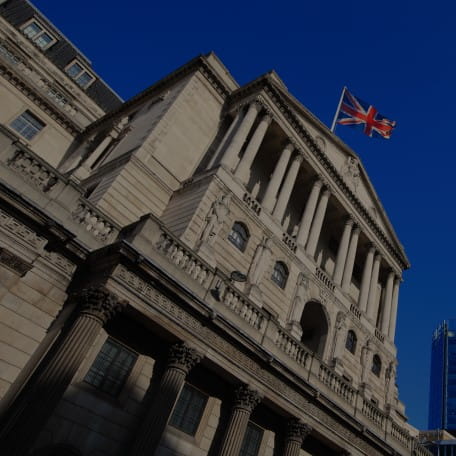Following key announcements from the Bank of England and US Federal Reserve this week, we take a quick look at how interest rates uncertainty can affect investors.
UK homeowners will be all too aware of the speed with which changes to economic policy can spread beyond the political sphere, creating financial market volatility which has a very real impact on individuals’ everyday lives.
The now infamous September 2022 mini-budget from short-lived prime minister / chancellor duo Liz Truss and Kwasi Kwarteng is a case in point. They unleashed a range of stimulatory measures which seemed to fly in the face of the Bank of England’s (BoE) concerted efforts to apply restrictive policy aimed at keeping rampant inflation in check.
Anyone looking to remortgage a two-year fixed term deal in October would have been quoted a rate of around 6.5% - almost 2% higher than before the budget announcement a few weeks earlier. As investors digested the impact of Truss pushing the economic accelerator while BoE governor Andrew Bailey pumped the breaks, they swiftly concluded that government borrowing was likely to skid off-course. Government debt costs, as measured by bond yields, spiked to account for the extra borrowing implied by huge unfunded tax cuts. This filtered through in short order to much higher borrowing costs for homeowners too.
This spike in borrowing costs was a UK phenomenon, leading to a differential to other countries that was coined the “moron premium”, a label that could be interpreted as very apt or overly cruel depending on your political bent.
Although other developed economies avoided this own goal, they have also been grappling with the consequences of economic policy changes. Through 2022, the direction of this policy was relatively uniform, when looking at central banks in any case: a steady increase in interest rates to combat post-lockdown price inflation.
However, it’s often noted that markets are forward looking and once these expected rate cuts were “priced in”, they moved on to the next big question, which was: How high will rates go and when will they peak? One of the main investment narratives of the second half of 2022 became the concept of “peak rates” and the “rate pivot”. This point was widely expected to come in 2023, so as the new year approached, speculation around this key potential turning point mounted.
This has resulted in rising market volatility, most notably in bond markets initially, but more recently emanating out to equity markets too as the Silicon Valley Banking failure illustrated an unanticipated consequence of rising interest rates.
The confusion over the direction of interest rates this year is illustrated nicely in this chart, which shows the expected path of US and UK rates at the start of the month and in the aftermath of the rate decisions from the US Federal Reserve on Thursday and yesterday respectively.

While infuriating for anyone looking for some financial stability as they make key life choices such as buying a house, such economic uncertainty can be an unintuitive boost to investors, many of whom have bemoaned the low levels of market volatility brought about by the monetary policy in place over the last decade.
Donald Phillips, fund manager in the Global Fixed Income team, sums things up nicely:
“Far from a negative development, the return of volatility has been most welcome after a decade-plus of financial markets volatility being massively and artificially suppressed by extraordinary monetary stimulus – ultra low interest rates and huge bond-buying quantitative easing programmes.
As strategic investors in bond markets, we have a number of levers we can adjust to exploit different potential sources of alpha [as volatility rises].”
Read more of Donald’s thoughts: Why bond market volatility is good for strategic investors
KEY RISKS
Past performance is not a guide to future performance. The value of an investment and the income generated from it can fall as well as rise and is not guaranteed. You may get back less than you originally invested.
The issue of units/shares in Liontrust Funds may be subject to an initial charge, which will have an impact on the realisable value of the investment, particularly in the short term. Investments should always be considered as long term.
DISCLAIMER
This is a marketing communication. Before making an investment, you should read the relevant Prospectus and the Key Investor Information Document (KIID), which provide full product details including investment charges and risks. These documents can be obtained, free of charge, from www.liontrust.co.uk or direct from Liontrust. Always research your own investments. If you are not a professional investor please consult a regulated financial adviser regarding the suitability of such an investment for you and your personal circumstances.
This should not be construed as advice for investment in any product or security mentioned, an offer to buy or sell units/shares of Funds mentioned, or a solicitation to purchase securities in any company or investment product. Examples of stocks are provided for general information only to demonstrate our investment philosophy. The investment being promoted is for units in a fund, not directly in the underlying assets. It contains information and analysis that is believed to be accurate at the time of publication, but is subject to change without notice. Whilst care has been taken in compiling the content of this document, no representation or warranty, express or implied, is made by Liontrust as to its accuracy or completeness, including for external sources (which may have been used) which have not been verified. It should not be copied, forwarded, reproduced, divulged or otherwise distributed in any form whether by way of fax, email, oral or otherwise, in whole or in part without the express and prior written consent of Liontrust.










